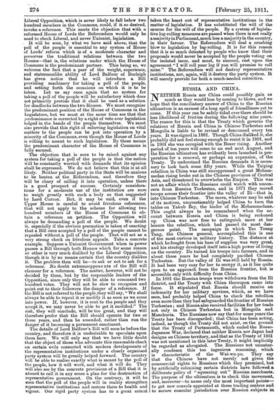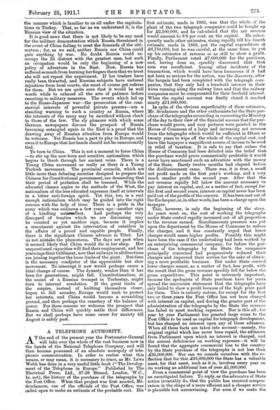RUSSIA. AND CHINA N EITHER Russia nor China could possibly gain
as much as they would lose by coming to blows, and we hope that the conciliatory answer of China to the Russian ultimatum is an earnest of a long spell of friendliness yet to come. If this year can be safely tided over there should be less likelihood of friction during the following nine years. The reason for this is that the Treaty which governs the relations of Russia and China in Chinese Turkestan and Mongolia is liable to be revised or denounced every ten years. It was signed in 1881. Though China disliked it; she probably did not feel strong enough to resist it in 1891, and in 1901 she was occupied with the Boxer rising. Another period of ten years will come to an end next August, and the Russian ultimatum has evidently been launched in pre- paration for a renewal, or perhaps an expansion, of the Treaty. To understand the Russian demands it is neces- sary to look back some fifty years. While the Taiping rebellion in China, was still unsuppressed a great Moham- medan rising broke out in the Chinese provinces of Central Asia, and threatened to overwhelm the Empire. This was not an affair which the Russians could watch with uncon- cern from Russian Turkestan, and in 1871 they moved troops across their frontier into the valley of Ili—that is, into Chinese Turkestan. The move, whatever may be said of its motives, unquestionably helped China to turn the tables on Yakub Bey, the leader of the Mohammedans. This ought always to be remembered when the ac- count between Russia and China is being reckoned up. China was now free to extinguish more at her leisure the rebellion, which had passed its most dan- gerous point. The campaign in which Tso Tsang Tang, the Chinese general, accomplished this is one of the most curious in military history. The distance at which he fought from his base of supplies was very great, and his strategy developed itself into a high power of living on the country. He turned his troops into farmers, and in about three years he had completely pacified Chinese Turkestan. But the valley of Ili was still held by Russia. It had been very easy for her to occupy it, as it lies quite open to an approach from the Russian frontier, but is accessible only with difficulty from China. In 1881 the Russian troops were withdrawn from the Ili district, and the Treaty with China thereupon came into force. It stipulated that Russia should receive an indemnity for her military services, which, as we have seen, had probably helped China to check the rebellion even more than they had safeguarded the frontier of Russian Turkestan ; and Russia also received facilities for her trade not only in Chinese Turkestan but in Mongolia and Manchuria. The Russians now say that for some years the Treaty has been disregarded ; that China has been acting, indeed, as though the Treaty did not exist, on the ground that the Treaty of Portsmouth, which ended the Russo- Japanese War, declared that neither Russia nor Japan had designs on Chinese territory, and that as the Treaty of 1881 was not mentioned in this later Treaty, it might implicitly be regarded as abrogated. The Russians not unnatur- ally condemn this too ingenious reasoning, which is characteristic of the Wai-wu-pu. They say that the Chinese have not merely not given the commercial rights to Russians which they promised, but by artificially colonising certain districts have followed a deliberate policy of " squeezing out " Russian merchants. The purpose of the ultimatum is to check this movement, and, moreover—to name only the most important points— to get new consuls appointed at three trading centres and to secure consular jurisdiction over Russian subjects in. the manner which is familiar to us all under the capitula- tions in Turkey. That, so far as we understand it, is the 'Russian view of the situation.
It is good news that there is not likely to be any need lor the military demonstration which Russia threatened in the event of China failing to meet the demands of the ulti- matum ; for, as we said, neither Russia or China could gain anything by war. No doubt Russia could re- occupy the Ili district with the greatest ease, but such an occupation would be only the beginning of a new policy of adventure in the East. Now, Russia has suffered so much from burning her fingers there that we trust she will not repeat the experiment. If her traders have really been thwarted, and Russian subjects have endured injustices from local courts, she must- of course get redress for them. But we are quite sure that it would be well worth while to exhaust all the arts of patience before resorting to military measures. The events which led up to the Russo-Japanese war--the prosecution of the com- mercial interests of powerful private persons—are a standing warning to such a country as Russia, where the interests of the many may be sacrificed without check to those of the few.. The sly pleasure with which some German newspapers diticuss the prospect of Russia becoming entangled again in the East is a proof that the drawing away of Russian attention from Europe would be welcome. Yet Russia has a part to play in Europe, and owes it to Europe that her hands should not be unnecessarily tied.
To turn to China. This is not a moment to force China —to stir up the new-born and sensitive nationalism which begins to throb through her ancient veins. There is a Young China movement as really as there is a Young Turkish movement. The provincial councils, which are little more than debating societies designed to prepare the Chinese for Constitutional government, are demanding that their period of probation shall be lessened. While the educated classes aspire to the methods of the West, the nationalism of the less educated, expresses itself at intervals in a bitter anti-foreign spirit. Yet this, too, is a real enough nationalism which may be guided into the right courses with the help of time. There is a pride in the army which was unknown a few years ago—another sign of a kindling natisestlism. And perhaps the very ;disregard of treaties which we are discussing may be counted as yet another sign, because it implies a resentment against the intervention of outsiders in the affairs of a proud and capable people. Finally, 'there is the significant Chinese advance in Tibet. Let 'us not mistake the phenomena. The days are past when it seemed likely that China would die in her sleep. Her unquestioned capacities will find their employment, and her yearnings their fulfilment, now that railways in all directions are joining together the loose limbs of the giant. But time is the necessary coadjutor of the appreciable but slow movement. To interrupt it now would perhaps cause a fatal change of course. The dynasty, weaker than it has been for generations, might fall. Constitutionalism, at the sound of a Russian trumpet in Turkestan, might turn to internal revolution. If the great limbs of the empire, instead of knitting themselves closer, began to fall asunder, Europe would rush to protect her interests, and China would become a scrambling ground, and then perhaps the cemetery of the balance of power. For these reasons we welcome the prospect that Russia and China will quickly settle their differences. But we shall perhaps have some cause for anxiety till August is safely past.







































 Previous page
Previous page